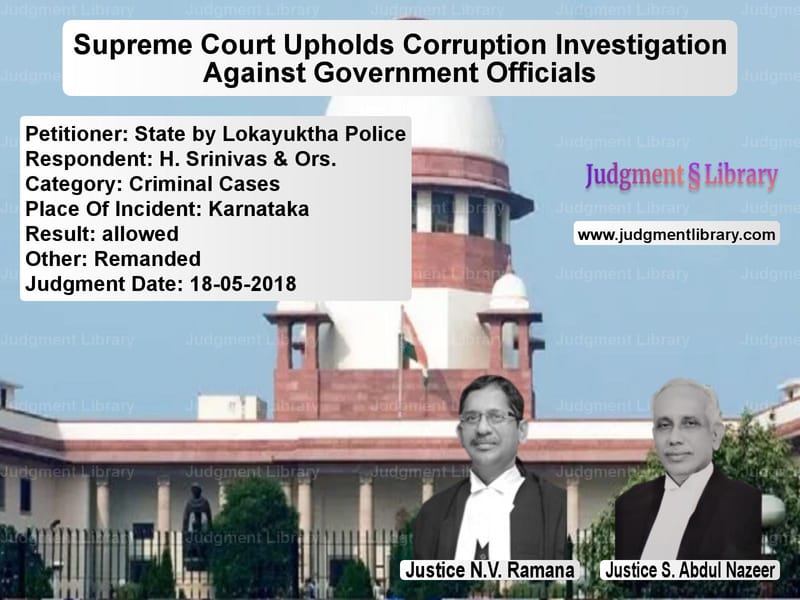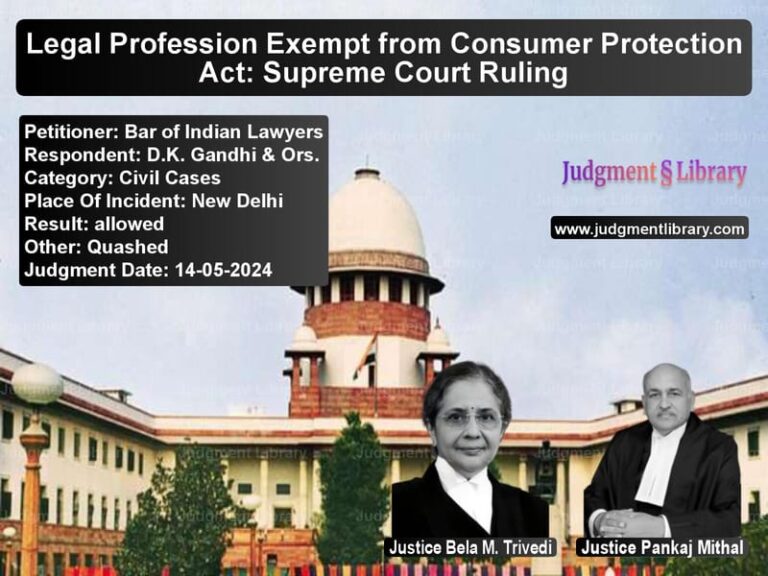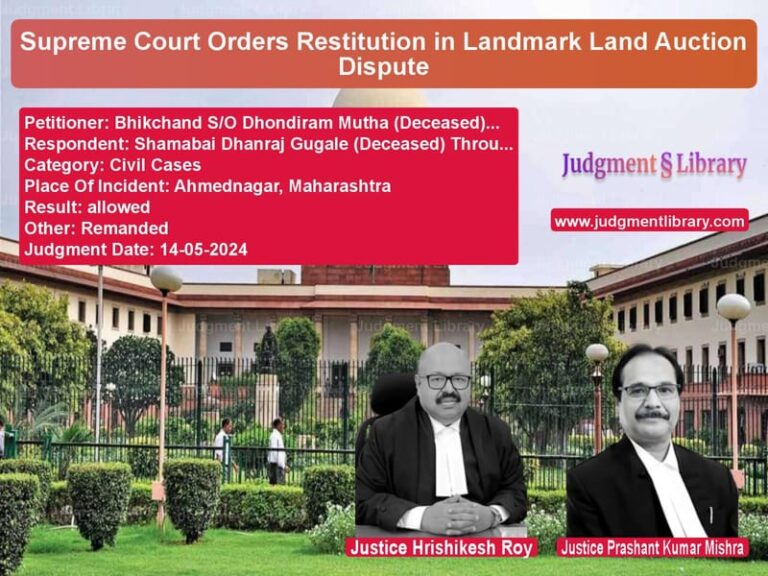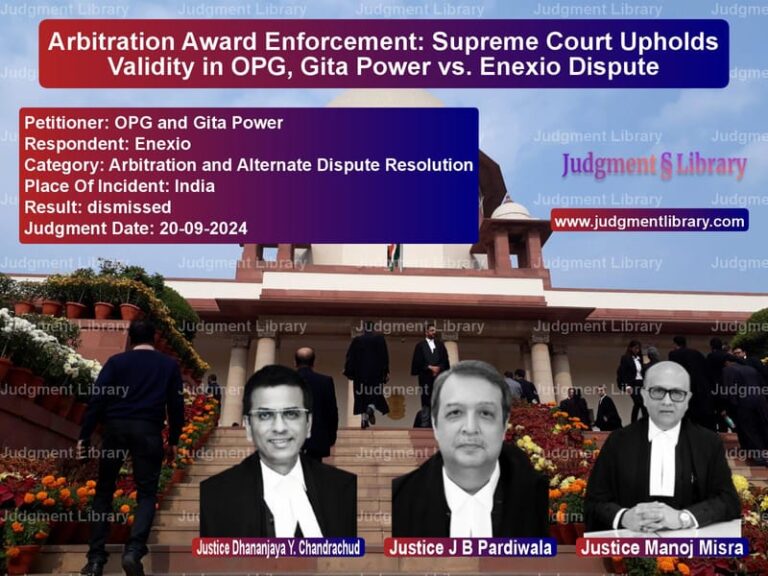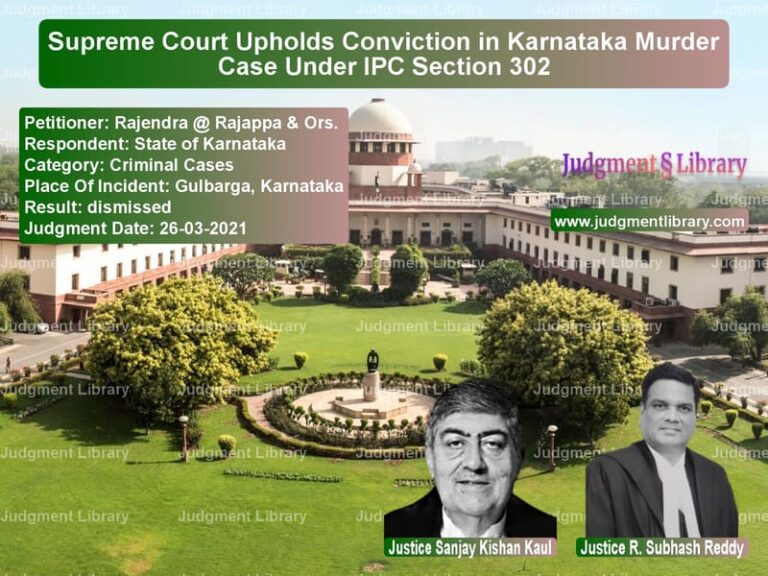Supreme Court Upholds Corruption Investigation Against Government Officials
The case of State by Lokayuktha Police vs. H. Srinivas & Ors. is a landmark judgment where the Supreme Court upheld corruption investigations against government officials. The case highlights procedural aspects of preliminary inquiries and the validity of investigations against public servants accused of amassing disproportionate assets.
The Supreme Court overturned the Karnataka High Court’s decision, which had quashed FIRs against the accused officials on technical grounds. The Court ruled that the absence of a General Diary entry for preliminary inquiries does not render an investigation illegal. This decision strengthens the fight against corruption and clarifies investigative procedures under the Prevention of Corruption Act, 1988.
Background of the Case
The case arose from corruption allegations against government officials in Karnataka. The Lokayuktha Police had conducted preliminary inquiries into the assets of two senior government officers:
- H. Srinivas, an Assistant Engineer at Jagaluru Pattana Panchayat, Davangere District.
- C. Mrutyunjayaswamy, a Secretary to the Government, Public Works Department, Bengaluru.
Both officials were accused of accumulating disproportionate assets beyond their known sources of income. The Lokayuktha Police filed FIRs under Section 13(1)(e) read with Section 13(2) of the Prevention of Corruption Act, 1988.
However, the Karnataka High Court quashed the FIRs, ruling that the preliminary inquiry lacked a General Diary entry, making the investigation procedurally flawed.
Key Legal Issues Considered
The Supreme Court examined several critical legal questions:
- Whether an investigation becomes invalid if a preliminary inquiry is not recorded in the General Diary.
- Whether the Karnataka Lokayuktha Police followed due process in filing the FIRs.
- Whether quashing the FIRs at the preliminary stage was justified.
- Whether the Lalitha Kumari judgment, which mandates preliminary inquiries in certain cases, was misinterpreted by the High Court.
Arguments of the Parties
Petitioner’s (State by Lokayuktha Police) Arguments
The State of Karnataka, represented by Additional Advocate General, argued:
- The High Court’s order was cryptic and lacked reasoning.
- The General Diary entry is not a precondition for filing an FIR.
- Defects in the preliminary inquiry do not vitiate the entire investigation.
- Several judgments, including P. Sirajuddin vs. State of Madras, have upheld preliminary inquiries in corruption cases.
- Quashing an FIR at an early stage prevents a fair trial and investigation.
Respondent’s (H. Srinivas & Ors.) Arguments
The accused officials, represented by senior counsel, contended:
- The investigation was illegal as the preliminary inquiry was not entered in the General Diary.
- The Lalitha Kumari judgment mandates strict adherence to procedural requirements.
- The failure to maintain proper records rendered the investigation void.
- The officials were targeted unfairly, and the cases should be quashed.
Supreme Court’s Ruling
The Supreme Court ruled in favor of the State and reinstated the FIRs against the accused officials. The key findings of the Court include:
“The absence of entries in the General Diary concerning the preliminary inquiry does not render the entire investigation illegal. The trial court must examine the evidence on merits.”
The Court made several crucial observations:
- There is no statutory requirement under the Code of Criminal Procedure (CrPC) or the Prevention of Corruption Act that mandates recording a General Diary entry before registering an FIR.
- The High Court misinterpreted the Lalitha Kumari judgment.
- Technical irregularities in investigation procedures should not lead to quashing FIRs.
- Investigations should continue, and the trial court should determine the merit of the charges.
Implications of the Judgment
The Supreme Court’s ruling has significant legal and administrative implications:
- Strengthens anti-corruption measures by preventing officials from escaping prosecution on technical grounds.
- Clarifies that minor procedural lapses do not invalidate corruption investigations.
- Upholds the role of the Lokayuktha Police in investigating disproportionate asset cases.
- Encourages lower courts to focus on substantive evidence rather than procedural defects.
Key Takeaways
- Corruption cases must be adjudicated on merits, and technical flaws should not hinder prosecution.
- General Diary entries are useful but not mandatory for a valid preliminary inquiry.
- The High Court overstepped by quashing the FIRs prematurely.
- The Supreme Court’s ruling ensures fair trials in corruption-related offenses.
Conclusion
The Supreme Court’s judgment in State by Lokayuktha Police vs. H. Srinivas & Ors. is a landmark decision in corruption cases involving public servants. The ruling clarifies that investigations cannot be nullified due to minor procedural errors, ensuring that corruption cases proceed to trial based on their merits.
By reinstating the FIRs, the Court reaffirmed the principle that the fight against corruption must not be hindered by legal technicalities. This judgment sets a strong precedent for future corruption cases, ensuring that public officials accused of amassing disproportionate assets are held accountable through proper legal proceedings.
Petitioner Name: State by Lokayuktha Police.Respondent Name: H. Srinivas & Ors..Judgment By: Justice N.V. Ramana, Justice S. Abdul Nazeer.Place Of Incident: Karnataka.Judgment Date: 18-05-2018.
Don’t miss out on the full details! Download the complete judgment in PDF format below and gain valuable insights instantly!
Download Judgment: State by Lokayuktha vs H. Srinivas & Ors. Supreme Court of India Judgment Dated 18-05-2018.pdf
Direct Downlaod Judgment: Direct downlaod this Judgment
See all petitions in Fraud and Forgery
See all petitions in Public Sector Employees
See all petitions in Bail and Anticipatory Bail
See all petitions in Judgment by N.V. Ramana
See all petitions in Judgment by S. Abdul Nazeer
See all petitions in allowed
See all petitions in Remanded
See all petitions in supreme court of India judgments May 2018
See all petitions in 2018 judgments
See all posts in Criminal Cases Category
See all allowed petitions in Criminal Cases Category
See all Dismissed petitions in Criminal Cases Category
See all partially allowed petitions in Criminal Cases Category

